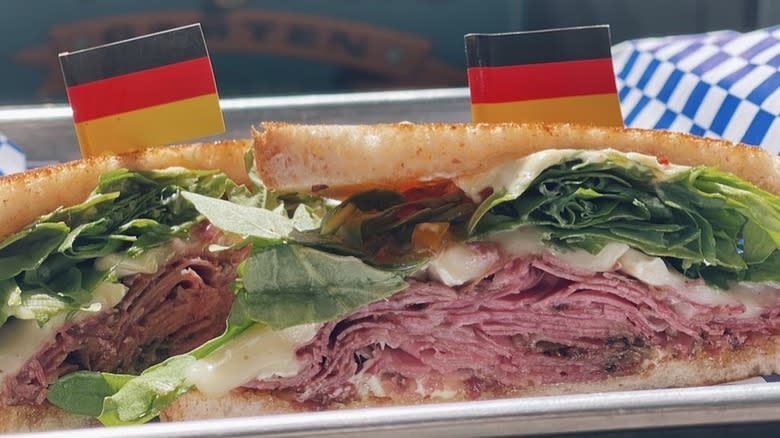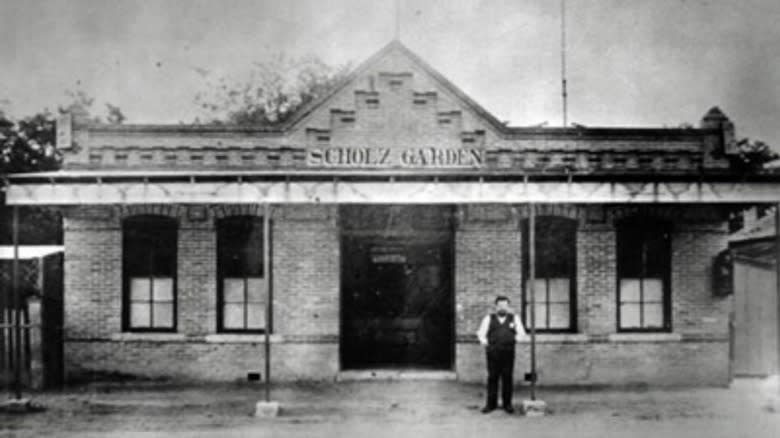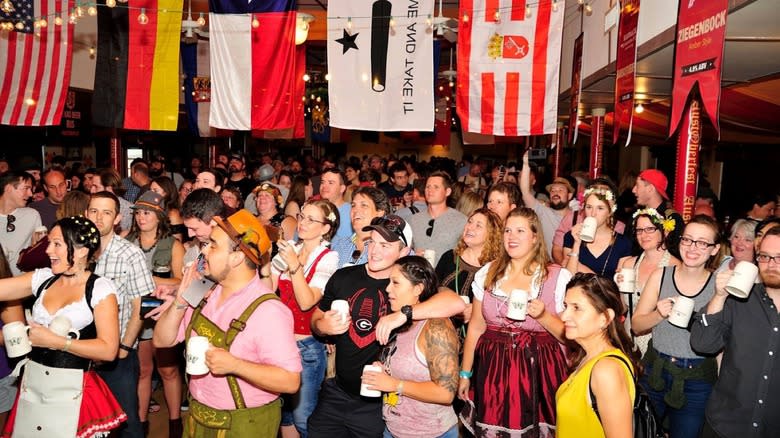One Of Texas' Oldest Restaurants Was Also A Second Home For German Immigrants

Texas is a state rich with culinary tradition, but one of its oldest restaurants is emblematic of a history that may not be well known to people from outside the state. While Tex-Mex and barbecue rightfully get a lot of attention in the Lone Star State, German cooking and cuisine is also a major influence that lingers to this day. Germans made up a major portion of the early waves of immigration to the United States, and in the 1830s, this extended to Texas, which was still part of Mexico at that time. These were the immigrants that would eventually go on to found Spoetzl Brewery and create one of Texas' most famous German-inspired exports in Shiner Bock, but before that happened those Germans needed a place to gather, and one of the first spots they did so was a bar named Scholz Garten.
Founded in 1866 in Austin, Scholz Garten is a German beer garden that has remained a popular local watering hole. It's sometimes called the oldest restaurant in Texas, although the temporarily closed Stagecoach Inn in Salado dates back to 1861 under its original name, the Shady Villa Hotel. Located along San Jacinto Boulevard near both the Texas Capitol Building and the University of Texas, Scholz Garten has had a reputation for attracting a diverse clientele for community gatherings, debate, and politics since the 19th century. It all started with an immigrant named August Scholz, who founded the saloon and quickly turned it into a local institution.
Read more: Restaurant Foods That Always Taste Better Than What You Make At Home
The History Of Austin's Scholz Garten

A veteran of the Civil War, August Scholz originally purchased the site of the future Scholz Garten in 1862 and operated it as a boarding house. German settlers had been flowing into the area around Austin for decades by that point, forming a "German Belt," that ran from the Gulf Coast to Texas's Hill Country west of Austin, and included towns like Fredericksburg and New Braunfels. After the arrival of the first railroad in 1871, Austin grew rapidly. More German professionals and laborers were drawn to the boomtown, and by 1875 they made up more than 7% of the population. Scholz joined other local beer gardens to become the cultural center of German life in Austin and soon launched a Sunday concert series that combined beer and musical entertainment in the German tradition.
Scholz's ownership eventually passed to August Scholz's stepson and then a brewery before being acquired by the Austin Saengerrunde in 1908. A German singing club that survives to this day, the Saengerrunde built the hall that Scholz is currently located in. They also built a bowling alley next door, with bowling being an important aspect of German culture. That alley remains open as well and is one of the oldest in the country. The Saengerrunde shepherded Scholz Garten through Prohibition and both World Wars before leasing the management of the saloon in 1962. Since then it has run through numerous operators, and undergone multiple renovations, but endured as a beloved local gathering spot.
Scholz Garten Today

The Saengerrunde still owns the property Scholz operates from, but recent changes have mostly been driven by managers who lease the business from them. The most recent is Daniel Northcutt, who took over in 2017 and moved to change the eclectic food menu to focus more on quality German cooking. Some items like nachos were removed from the menu, over the objections of change-averse regulars, and replaced with artisan German bratwurst, specialty sausages, and house-made spaetzle. Scholz Garten has also started serving liquor for the first time, as it used to be exclusively focused on beer. While Northcutt admits the changes were difficult, the food has been highly praised and even earned the approval of the current Austin Saengerrunde.
The beer garden has retained its legacy as a gathering place for students and politics as well. A diverse array of bands plays multiple nights a week, and Presidential candidate Beto O'Rourke held a rally there in 2019. While some of the interior has been updated, Scholz still boasts its wooden stage and German murals. The saloon also still has its iconic garden, with communal tables shaded by trees. While the menu and management may change, the legacy of Scholz and the same forces that have pulled people there for generations means it's likely to stick around for the long term.
Read the original article on Tasting Table.

